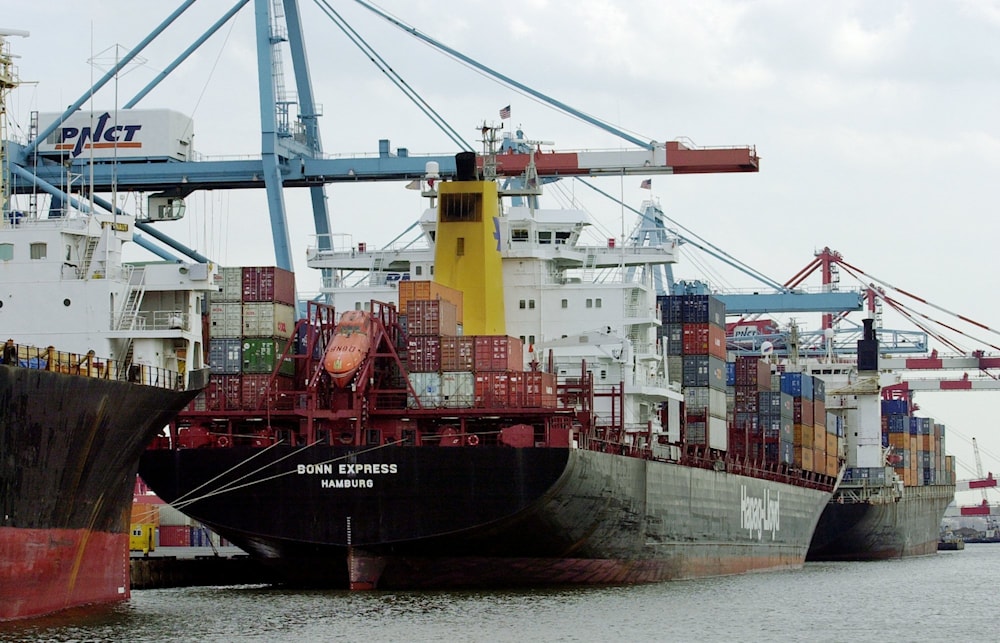Trump's tariffs mark a shift toward protectionism: WSJ
Manufacturers and markets are facing disruption from Trump's tariffs, fueling uncertainty about their future.
-

Container cargo ships line a dock at Port Newark in Newark, N.J., on April 3, 2002. (AP)
A Wall Street Journal report published on Tuesday discussed Trump's new tariffs on the US' neighbors, saying that they have ended decades of free trade between the US, Mexico and Canada, disrupting various industries.
The 25% tariffs will apply to most imports, with energy products taxed at 10%. Canada has announced plans for retaliatory tariffs. If the tariffs stay in place, they could dramatically change US relations with its major trading partners, reversing the long-standing trend of expanding free trade.
The report mentioned that the three countries had been operating under a revised trade agreement negotiated by Trump. Additionally, Trump signed an executive order imposing a 10% tariff on China, effective the same day.
Moreover, the Trump administration has cited the flow of drugs and undocumented immigrants across the US border as justification for tariffs, and has also said that tariffs would lead to more manufacturing in the US.
On Monday, he said, "So they’re going to have a tariff, and what they have to do is build their car plants, frankly, and other things, in the United States, in which case you have no tariffs."
What impact do tariffs have?
The WSJ reports that uncertainty is already affecting the economy, hindering business orders and complicating company planning. This is compounded by other issues, such as widespread federal worker layoffs, reductions in government-funded programs, and immigration restrictions.
On Monday, US stocks dropped significantly after Trump confirmed the tariffs, with the Nasdaq Composite, which is tech-heavy, leading the decline with a 2.6% drop.
Manufacturers are feeling the pinch. "Tariff threats and uncertainty are extremely disruptive," one respondent to the Dallas Fed’s February manufacturing survey, released last week, noted.
The report highlighted that Goldman Sachs observed how Monday's February manufacturing report from the Institute for Supply Management mentioned tariffs 20 times, a significant increase from just four mentions in January.
Moreover, the Institute's Purchasing Managers' Index declined slightly in February, indicating a slowdown in manufacturing expansion.
What do companies have to say?
According to the piece, during Ford Motor’s earnings call last month, Chief Executive Jim Farley cautioned that prolonged 25% tariffs on Canada and Mexico "would have a huge impact on our industry, with billions of dollars of industry profits wiped out."
Preparing for the tariffs is also difficult for some small businesses. The WSJ report noted that the Penny Ice Creamery in Santa Cruz, California, for example, lacks the extra space to stockpile specialty sprinkles imported from Canada. Additionally, budgets remain tight following the slower winter months, co-owner Zachary Davis said.
That being said, some companies plan to absorb the costs, at least for the time being.
For instance, Chipotle Mexican Grill stated that tariffs on Mexican imports like avocados could impact its profit margins this year. On Monday, the company said it plans to absorb potential cost increases instead of raising prices, given the uncertainty over how long the tariffs will remain in effect.
What happens next?
On the other hand, economists warn that tariffs could drive up prices while slowing the economy, heightening the risk of "stagflation," a combination of weak growth and high inflation.
If tariffs remain in effect, they might push up inflation in March, April, and May as firms raise prices to make up for higher import costs, said Michael Feroli, chief US economist at JPMorgan Chase. The tariffs also might hurt US exporters if Canada’s and Mexico’s economies take a hit and if they retaliate with tariffs of their own.
"If those countries go into recession, that alone is a reason to expect US exports to those countries to slow," he said.

 4 Min Read
4 Min Read








